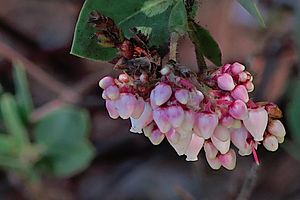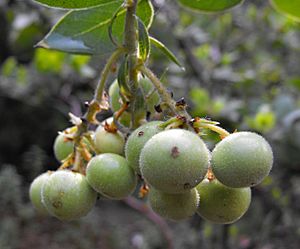Santa Catalina Island manzanita facts for kids
Quick facts for kids Santa Catalina Island manzanita |
|
|---|---|
 |
|
| Conservation status | |
| Scientific classification | |
| Kingdom: | |
| (unranked): | |
| (unranked): | |
| (unranked): | |
| Order: | |
| Family: | |
| Genus: | |
| Species: |
A. catalinae
|
| Binomial name | |
| Arctostaphylos catalinae P.V. Wells
|
|
The Santa Catalina Island manzanita (scientific name: Arctostaphylos catalinae) is a special type of manzanita plant. It grows naturally only in Southern California.
Contents
Where This Plant Lives
This manzanita is found only on Santa Catalina Island. This island is one of the southern Channel Islands off the coast of California.
It grows in a specific kind of habitat called maritime chaparral. You can find it on the ridges of Catalina Island.
What the Santa Catalina Island Manzanita Looks Like
The Arctostaphylos catalinae is usually a large shrub. It often grows taller than 2 meters (about 6.5 feet). Sometimes, it can even look like a small tree, reaching up to 5 meters (about 16 feet) tall.
This plant has tiny glands and is covered in white, stiff hairs called bristles.
Leaves, Flowers, and Fruit
The leaves of this manzanita also have fine bristles. They are a dull, light green color. Each leaf can be up to 5 centimeters (about 2 inches) long and 3 centimeters (about 1.2 inches) wide.
Its flowers grow in an open, branching cluster. This cluster is called an inflorescence. It has leaf-like parts called bracts near the flowers.
The fruit of the Santa Catalina Island manzanita is round. It is a type of drupe, which means it has a hard pit inside. The fruit can be up to 1.5 centimeters (about 0.6 inches) wide.
See also
 In Spanish: Arctostaphylos catalinae para niños
In Spanish: Arctostaphylos catalinae para niños
 | John T. Biggers |
 | Thomas Blackshear |
 | Mark Bradford |
 | Beverly Buchanan |



